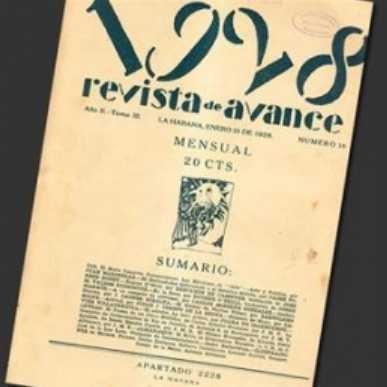4.1.1.25 The “Avance Magazine”, 1927 – 1930

The Revista de Avance contributed to the dissemination of avant-garde literature and had certain ties to the Grupo Minorista; but its purpose was broader; it sought and succeeded in bringing to the attention of its readers, for the enrichment of Cuban literature and culture, the new aesthetic and intellectual currents, authors, and works that were making a strong impact on the European continent.
In this sense, it was not limited to the literary field, but both pictorial art and music found space in its pages, not only foreign contributions but also national figures who had not yet been properly calibrated, such as Alejandro García Caturla and Amadeo Roldán.
The magazine was founded by “The Five”—as they were known in the cultural circles of the time—Alejo Carpentier, Martí Casanovas, Francisco Ichaso, Jorge Mañach, and Juan Marinello. Carpentier only worked on the first two issues, but he apparently managed to imbue it with his dilettante bent, which his successor, José Zacarías Tallet, would share.
In the first issue, dated March 15, 1927, the group of editors draws a parallel between the magazine and a ship, of which they call themselves the crew, and express: “For now, we are only tempted by the diaphanous purity that is enjoyed further out, far from the dirty beach, trodden a thousand times, where the useless ships or those that have already done their journey dry before the ironic gaze of the sea.”
The magazine also had numerous international contributors, including Paul Valery and Bertrand Russel, some Americans and the Spaniards Fernando de los Ríos, Gregorio Marañón, Eugenio D”Ors, Luis Araquistáin and Miguel de Unamuno, and the idea even had as its starting point the “Revista de Occidente”, founded by José Ortega y Gasset, with similar aspirations towards the rest of Europe.
In this sense, one of his main contributions was his contribution to what Marcelo Pogolotti calls “intellectual reconciliation” between Spain and Cuba, to heal the fissures that the long colonial period had created. This was especially true at a time when the American way of life was also breaking into literature, and there was a need to somehow return to the nourishing sources of the language, to the tradition and relevance of Hispanic literature, a country that was also immersed in a similarly oppressive political situation.
Its last issue was published in September 1930, following the assassination of Rafael Trejo and the fierce repression unleashed by Machado against students and intellectuals, for which Juan Marinello was imprisoned. The magazine announced its closure in the face of the imminent suspension of constitutional guarantees and the introduction of press censorship, strongly condemning the events.








